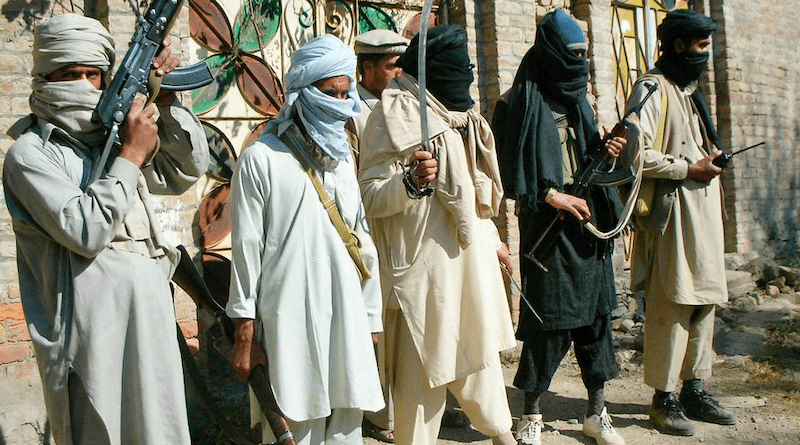Pakistan Army’s Tehreek-E-Taliban Pakistan Problem – OpEd
To be on the same page with Pakistan’s Foreign Minister Bilawal Bhutto Zardari is certainly not a compliment. Hence, when I say that by expressing the “hope that the establishment’s [Pakistan army’s] practice to remain apolitical will continue” he has dittoed my apprehensions [expressed in a recent article], I can’t be accused of trying to blow my own trumpet.
Though former army chief Gen Qamar Javed Bajwa has emphatically declared that Rawalpindi’s “institutional resolve to remain apolitical will remain steadfast,” this assertion has failed to find any meaningful resonance with domestic audiences. The reason is simple- the people of Pakistan know that unlike other nations, theirs is not a country with an army, but an army with a country, and as such it will never give the extra-constitutional powers it enjoys without any responsibilities!
Complete subservience of political parties to the army in Pakistan is no secret. In 2018, while nominating Gen Bajwa as the 68th most powerful person in the world, Forbes magazine justified the same by stating, “Although the president is his boss on paper, Pakistan’s chief of army staff is de facto the most powerful person in the nuclear armed state.” [Emphasis added].
So, it’s not surprising that Tehreek-e-Taliban Pakistan [TTP] terrorist group too has done the same. In a recent threat issued to Pakistan Peoples’ Party [PPP] and Pakistan Muslim League -Nawaz [PML-N], it has said, “if these two parties remain firm on their position and continue to be slaves of the army, then action will be taken against their leading people.” [Emphasis added].
Bilawal’s concerns are well founded because there seems to be an apparent dissonance as far as Islamabad’s response to the TTP threat is concerned. Pakistan’s Interior Minister Rana Sanaullah belonging to PML-N has told media persons that “Efforts will and are being carried out to bring the TTP to the [negotiating] table.” Unfortunately, while dealing with TTP is definitely the exclusive preserve of the interior ministry, the impetuous Foreign Minister Bilawal seems to think otherwise.
Why else would the central executive committee [CEC] of Bilawal Bhutto Zardari led PPP pass a resolution stating that “The CEC resolves that there should be no talks with militants until they lay down arms and accept the Constitution of Pakistan…” The scene thus seems all set for a showdown, between PPP and PML-N, and should this happen, the winner will obviously be the one who enjoys the support of Rawalpindi.
The moot point is that will Pakistan army chief Gen Syed Asim Munir opt for negotiations with TTP as disclosed by Saaullah, or initiate military action against this terrorist group as recommended by Bilawal? Gen Munir’s predecessor had opted for the former by accepting a ceasefire offered by TTP, permitting unconditional release of its jailed fighters and continuing to engage with TTP even though this terrorist group didn’t cease attacking security forces, law enforcement agencies and civilians.
Gen Munir has articulated Pakistan army’s “resolve to fight against terrorists without any distinction and eliminate this menace as per the aspirations of people of Pakistan.” However, is his subsequent call for the development “national consensus” on terrorism has raised red flags a sign of him dithering over walking his hard talk? Only time will tell.
With its strategy of installing a pliant dispensation in Kabul having backfired, Rawalpindi is in a real fix. Firstly, Taliban refused to act against TTP on the grounds that there is no presence of this terrorist group on its soil. Secondly, it has given a hard-hitting reply to the Pakistani interior minster’s suggestion that Islamabad could consider targeting TTP by undertaking trans-border operations into Afghanistan.
Lastly, Taliban spokesperson Zabihullah Mujahid lashed out at Islamabad by saying, “… the Pakistani side is also responsible to try controlling the situation,” adding that it should “refrain from giving baseless statements and [making] provocative assertions.” Since Taliban have responded to Pakistan army’s belligerence along the Durand Line in equal measure and in the process even inflicted fatal casualties, Rawalpindi can’t afford to take Kabul lightly.
Consequently, Rawalpindi is caught between the devil and deep sea. With no assistance forthcoming from Kabul, any meaningful military action by Pakistan army against TTP would necessitate targeting this terrorist group’s bases, hideouts and sanctuaries on Afghan soil. Doing this runs the grave risk of antagonising Kabul and culminating in direct confrontation between the Pakistan army and Taliban, something that Gen Munir would certainly like to avoid!
Gen Munir reacted to a statement made by an Indian army General, by saying, “Pakistan’s armed forces are ever ready, not only to defend every inch of our motherland, but to take the fight back to the enemy, if ever, war is imposed on us.” [Emphasis added] Similarly, in the aftermath of the Counter Terrorism Department compound siege operation in Bannu, Pakistani media mentioned Gen Munir saying that Pakistan army ‘is determined to take the battle to terrorists.’ [Emphasis added]
Gen Munir’s response to a hypothetical war situation developing on Pakistan’s Eastern border is indeed extremely menacing. However, by failing to act on the live threat from TTP and “take the battle to terrorists,” the Pakistan army chief has raised serious doubts regarding his determination to walk his talk, especially since this terrorist group has openly declared war against Pakistan by ordering its fighters to “carry out attacks wherever you can in the entire country.”
So, could it be that his stated “resolve to fight against terrorists without any distinction and eliminate this menace,” with the promise to “ta

